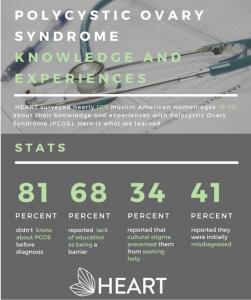by Wajihah Bhatti
 Polycystic Ovary Syndrome (PCOS) is one of the most common hormonal disorders among women of reproductive age, affecting 1 in 10 women worldwide. It’s the leading cause of female infertility and a risk factor for chronic health issues such as diabetes, heart disease, high blood pressure and endometriosis.
Polycystic Ovary Syndrome (PCOS) is one of the most common hormonal disorders among women of reproductive age, affecting 1 in 10 women worldwide. It’s the leading cause of female infertility and a risk factor for chronic health issues such as diabetes, heart disease, high blood pressure and endometriosis.
Though there is no uniform definition of PCOS, it is largely characterized by a hormonal imbalance due to an excess of androgens, or male hormones. PCOS can impair a woman’s ovulation, menstrual regularity, fertility and cause weight gain, excess facial or body hair, insulin resistance and many other symptoms that affect the body physically and emotionally. Although there is no cure for PCOS currently, early diagnosis and treatment can help control the symptoms and prevent long-term problems.
Despite it’s prevalence and risks, many women with the condition can be undiagnosed, misdiagnosed or diagnosed later than when they began to show symptoms. In a survey conducted by HEART, in which we asked Muslim women what their experience was with PCOS, we found that 81% of participants didn’t know about PCOS before being diagnosed. 68% reported lack of education as a barrier, 34% reported cultural stigma prevented them from seeking help and 41% reported that they were misdiagnosed.
This is why at HEART, we believe that it’s important to be an active participant in your healthcare. By seeking and equipping yourself with knowledge provided by reliable resources, you can feel empowered to ask questions and make informed choices about your health that work best for you. We’ve prepared a guide of questions to ask your provider about PCOS.
Watch our HEART to Heart video on Polycystic Ovary Syndrome to learn more about the disorder, it’s symptoms and treatments
Despite it being our Islamic duty to take care of our health, cultural stigmas can unfortunately sometimes get in the way. We thank you for joining us in combating these stigmas and increasing awareness about women’s reproductive health!











